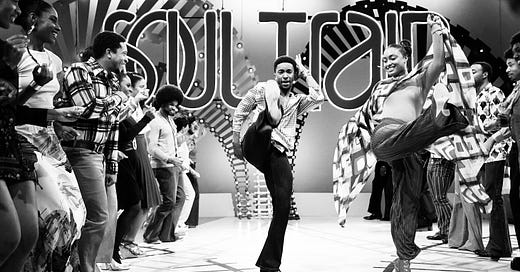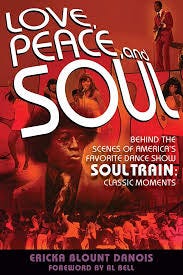“A big part of Black America died when Soul Train went off the air.”
Diamond-Michael Scott
Do you remember Soul Train, a badass American television show from back in the day that showcased incredible Black musicians and dancers. It aired nationwide from 1971 to 2006 and holds the record for being one of the longest-running syndicated programs in U.S. television history.
Soul Train was the brainchild of Don Cornelius, a former DJ from the Chicago area. He had this smooth, deep voice that really brought the show to life as its host. Every episode would start with the Soul Train theme song, symbolizing the journey of soul music from one city to another like a train. That iconic "Soooulll Traaain" opening would immediately grab your attention and make you wanna jump to your feet and dance in front of the TV screen.
Growing up in Columbus, Ohio, I have such fond memories of watching Cornelius kick off the show with style, followed by amazing musical performances by popular artists of the time. The camera would switch back and forth between the musicians and the talented dancers on the dance floor, creating an absolutely mesmerizing experience.
The television toggled back and forth between the featured musical act and the rhythmic dancers on the dance floor. At times, Cornelius would interject with an interview of the musical entertainers or one of the Soul Train dancers appearing on the show. He would close each show by wishing his viewers "love, peace, and soul!"
Cornelius was an amazing host of the show. He was always impeccably dressed, well-spoken, and classy. As Black Americans, seeing him on screen made us feel proud. It gave us permission to be ourselves and embrace our own unique style. In a world that often looked down upon us because of our race, Soul Train made us feel good about who we were.
Every Sunday for 35 years, Soul Train brought us a dose of Black culture and identity. It was all about the music and the dance moves that defined the times. Cornelius called it "the hippest trip in America" because it showcased the latest dance moves, hairstyles, and fashion trends.
Over time it became the ultimate platform for both established and up-and-coming musicians, giving audiences across the nation a glimpse into the ever-evolving Black music scene. Soul Train was a true celebration of our culture and it will forever hold a special place in our hearts.
Over the years, many noted entertainers, most Black, some white graced the show. The seemingly infinite list of those who made appearances included Aretha Franklin, Barry White, James Brown, Michael Jackson and the Jackson 5, KC and the Sunshine Band, and Anita Baker, among scores of others.
Cornelius served as Soul Train’s host until 1993, when he took on the role of "host emeritus," introducing new guest emcees for the show. He moved from independent producer to partner of Tribune Entertainment Company, the show’ s producer. Sadly, in 2012 amid some significant health and life issues, Cornelius committed suicide in Los Angeles.
In an interview with “Great Books, Great Minds,” I asked Ericka Blount Danois author of the book Love, Peace, and Soul: Behnd the Scenes of America’s Favorite Dance Show for her thoughts about the broader significance of Soul Train in the annals of Black History? She had this to offer:
“I think that Soul Train provided a platform for authentic and unfiltered black life. A platform that did not exist previously. Kids that had been creating their own dances in the street suddenly were given recognition for their talents. Musicians that were not able to make it on shows like Bandstand were now given a national platform. White folks who hadn't seen the full breath of black talent were able to witness it through their television screens. Poets, authors, comedians like Richard Pryor who hosted an entire show were given a national audience.”
Ericka notes that Soul Train was the longest running first-run nationally syndicated show in television history.
“Don Cornelius, had ownership of the show - so it was black-owned with black sponsorship through Johnson and Johnson products. In my book I recount a scene where Martin L. King Jr. remarks that Soul Train with solely black sponsorship was the definition of black power.”
In terms of the major catalyst behind her decision to write “Love, Peace, and Soul, she had this to say:
“I'd started just wanting to know what happened to my favorite dancers from Soul Train. When I found out the accomplishments they'd had - Damita Jo dancing for the Queen of England, Cheryl Song dancing with Michael Jackson and Rick James - to name a few I ended up going down a rabbit hole of rich history about Don Cornelius, about the show, about the dancers, the people that worked on the show and the guests. So many surprises - first that comes to mind was that the legendary Chicago Bears football player Walter Payton was once a dancer on Soul Train.”
In a concluding thought, Ericka shared how the show has left a lasting legacy Black music and artistic creation:
“I think that every dance show that exists now does so on the shoulders of Soul Train. But also every black-owned network that came after Soul Train - BET, TV One, etc. There is a reason that there hasn't been a show since that has the kind of magnetism that Soul Train had - with superstar guests, electric dancers, a charismatic host and black talent behind the scenes. It can't be duplicated. It was a forum for black talent that will live on in history forever.”






Soul Train was the best. Loved dancing along in my den. Thanks for letting us know about this book!
Wonderful share.
Did you get a chance to see the Summer of Soul documentary? I loved watching it in the old Castro Theater with a director Q&A. The idea for it was initially sparked by seeing Soul Train playing at a cafe in Japan ... Interesting stuff if you're not familiar with the story: https://variety.com/2021/artisans/awards/summer-soul-questlove-editing-1235133563/
And the documentary is amazing.